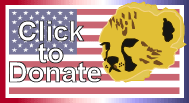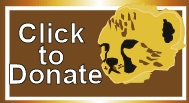Yesterday was a long day for one young cheetah here at CCF. Through a series of events, he arrived a month ago underweight, in ill health, and with a bad fracture of the distal femur, just above the knee. Since he was about15 months old, this meant his growth plate was primarily affected, but happily the stifle (knee) joint itself was unaffected. Mother nature, being the ultimate healer, formed a lot of scar tissue and bone callous around the fracture in an attempt to stabilize it even though it was not in the correct anatomic alignment, while staff at CCF worked to get the cheetah strong enough health wise to withstand a surgery to repair the leg.
The day finally arrived when the cheetah was declared fit for surgery, and the local veterinarian was ready after ordering special plates and instruments to repair it. Everything went like clockwork from getting the cheetah "Axel" into his transport cage to anesthetizing him at the vet. All the vital statistics were very stabile during the 6 hour long procedure, and he had IV fluids and medications for infection and pain/inflammation control post-op.
The surgery itself was difficult due to the amount of scar tissue and bone callous formation around the old fracture, Mother Nature had worked overtime! Muscles had contracted to counteract for the change in bone positioning after the initial injury, and all required gentle retraction and stretching in order to replace the femur into a proper anatomic alignment. After several hours this goal occurred with a resounding "sthwopp" sound. After that, life was relatively easy aligning the plate on the lateral side of the fracture, placing the screws and then after flushing the area with sterile saline closing the muscle and other tissues in such a way as to support the joint and prevent the incision from opening. Since a cheetah is unlikely to stand quietly and allow suture removal without anaesthesia, sutures need to be placed under the skin and the top covered with insect preventative. Radiographs showed a superb alignment of the fracture and his recovery went very smoothly. After returning to CCF, he stayed in a quiet capture crate overnight at our clinic here.
Great cheers were had all 'round when he took and ate a small meat chunk with his medication the next day, and then upon release to a small enclosure where he will continue to recover with medication for the next 10 days. Further updates will occur as he continues to recover over time. As to his long term outlook he will become one of the permanent residents since he cannot return to the wild with this injury. However, he should have good life quality in running about here and playing with his sister.
Written by our visiting vet Kris Kingery.





No comments:
New comments are not allowed.